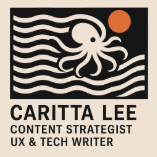Case study: Kestrel Microcopy Style Guide
Scaling content consistency across 70+ product designers after UX writing team layoff
Overview
Watch one content designer scale expertise across teams, helping 70+ product designers create consistent microcopy with visual guidelines and AI assistance at CrowdStrike. CrowdStrike is a leading cybersecurity platform protecting endpoints worldwide.
Role: Senior Content Designer (project lead)
Timeline: 9 months
Tools: Miro, Figma, Confluence
Team: Product designer III
After layoffs eliminated a 23-person UX writing team, senior leadership expected product managers and product designers to write the UI microcopy. For Project Kestrel, a new initiative that was launched in beta, 70+ product designers created inconsistent microcopy and content patterns, causing cross-functional confusion and unclear user experiences.
Research
As the lead, I collaborated mainly with the product designers and engineers, but also consulted with the technical writers and accessibility committee, which I was part of.
Research included:
Vice President (VP) Feedback
The VP of Design noted inconsistencies in Figma prototypes. Instead of manually auditing all Figma files, which was too time-consuming, I made an audit template in Miro. I crowdsourced audits by asking designers to provide examples in the Miro board, so it took less time to review use cases in a consistent format, with all the necessary information.
2. Product designer feedback
Insight 1
Inconsistency: Different message styles, content patterns (past and present tense verbs, noun + verb or verb + noun) , and casing approaches (sentence vs. title case)
Insight 1
Component confusion: Designers didn’t know when to use component variations
Insight 1
Component confusion: Designers didn’t know when to use component variations
Insight 1
Component confusion: Designers didn’t know when to use component variations
Insight 2
Terminology conflicts: Different words for similar functionalities, eg, “Edit,” vs “Update,” Ambiguous terms like "object," "data grid," "view," and "workbook"
Insight 2
Consistency concerns: Concerns about maintaining consistent terminology across the product UI
Insight 2
Consistency concerns: Concerns about maintaining consistent terminology across the product UI
Insight 2
Consistency concerns: Concerns about maintaining consistent terminology across the product UI
Content Design Process
Discovery & Collaboration
Work sessions with Security Strategists and Practice Advisors informed my content redesign ideas. They walked me through the steps where they saw their customers struggling. After these sessions, I went through the wizard to create each goal and SLA a few times to familiarize myself with the existing flow.
During this exercise, I realized that asking users to pick a goal type at the start added unnecessary complexity, since they needed to know what they wanted to make in the first place.
Wireframing & Iteration
I started wireframing in Miro to wireframe and share some new content design ideas with the UX designer, product manager, advisors, and strategists. I made several rounds of iterations after getting some feedback:
Attempt 1:
Added a new goal to Step 1 and rewrote the querying copy in question format
Attempt 3:
Rewrote copy based on the type of data the user chose
Progressive Disclosure
Break tasks into smaller chunks to avoid overwhelming users
Attempt 2:
Asked Engineering if we could display content based on user selections—they said yes
Attempt 4:
Combined Steps 2 and 3, since content was relevant to the selected content type
After getting approval from other disciplines, I shared my final recommendation with the PM. We didn't have time to test it, but given the feature's dismal performance, anything was an improvement.
Content Design Strategy
Based on research insights, I proposed redesigning content around three key principles:
Solution: Step-by-Step Content Redesign
Step 1: Goal Selection
Changes made:
Added preset templates of popular use cases like Remediate All Critical Vulnerabilities and Ensure Assets Have Ownership Tag for easy customization
Included a New Goal option that didn't require users to know the goal type upfront
Removed the barrier of having to understand technical goal types before starting
Challenge
Insight 3
Clarity issues: Wordy, unclear and confusing copy
Insight 3
Problem-solving gaps: No clear approach for solving content problems
Insight 3
Problem-solving gaps: No clear approach for solving content problems
Insight 3
Problem-solving gaps: No clear approach for solving content problems
Designer Pain Points
Couldn't distinguish when to use component variations
No clear approach for solving content problems
Concerns about maintaining consistent terminology across product UI
My Pain Points
Product designers constantly Slacking with questions]
Needed systematic way to prioritize work - everything seemed important
Required context first before helping designers effectively
Match Mental Models
Format tasks in questions to help user think about tasks at hand
Contextual Guidance
Provide help when and where users need it
Step 2: Configuration
Changes made:
Allowed users to select either Remediate Vulnerabilities or Configure Assets, which refreshes the wizard to display the related vulnerabilities or assets flow
Decoupled query building into separate steps
Rewrote content as questions to help users think about the task at hand
Added contextual explanations ("You'll load or build a query to narrow down your assets") and links to help documentation
Step 3: Review
Changes made:
Told users the type of goal they created and defined it
Required goal naming to help with future goal management
Results
Quantitative Impact
95%
completion rate (up from 65%)
Qualitative Impact
30%
reduction in support tickets
“THANK YOU, THANK YOU, THANK YOU! This is so much easier to use than the first version.”
“This is a huge improvement. My customers won’t stop raving about it!”
75%
faster creation time
800+
goals created in Week 1







